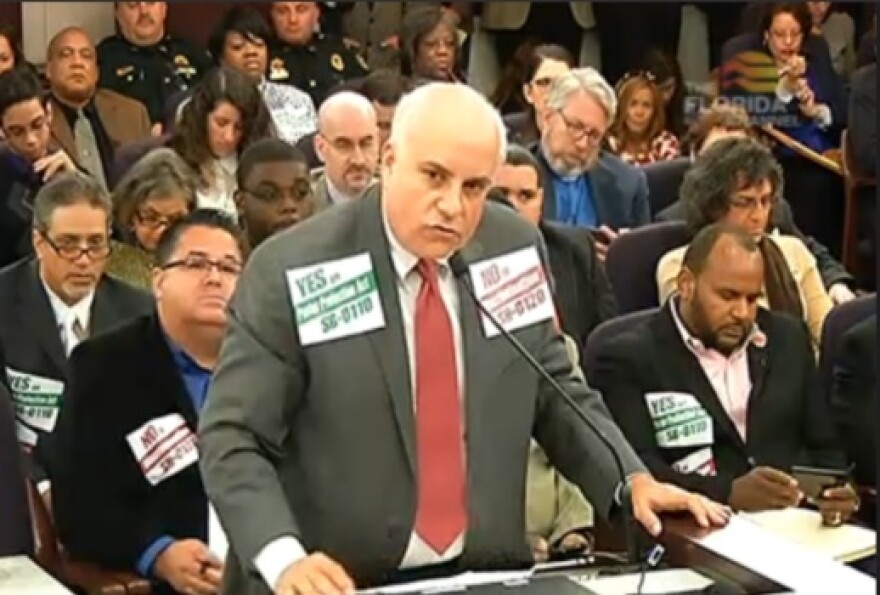Today marks seven months since the U.S. Supreme Court ruled in favor of marriage equality. But while marriage is legal—in Florida so is discrimination. Some state lawmakers want to change that, but they've got a long way to go.
Last June was a moment of celebration in the lesbian, gay, bisexual and transgender community. The U.S. Supreme Court ruled same-sex couples have the right to marry under the Fourteenth Amendment’s equal protection provisions.
“But in many places in the state of Florida you can still be fired simply for being gay, and we really need to work on that,” Rep. David Richardson (D-Miami Beach) said at the time.
Many jurisdictions in Florida have passed local ordinances to protect LGBT rights, but state lawmakers are attempting to extend those protections throughout the state. Sen. Joseph Abruzzo (D-Wellington) has filed a bill prohibiting discrimination based on sexual orientation—real or perceived, and gender identity or expression.
“We quite possibly have one of the most significant civil rights bills in the past forty years in front of you right now,” Abruzzo told a Senate panel Tuesday.
“Current state law prohibits discrimination in employment housing and public accommodations on the basis of race color religion sex national origin age handicap or marital status,” he said. “The Florida Competitive Workforce Act adds sexual orientation and gender identity within these protected class[es].”
Normally, this is the part of the story where you’d hear voices speaking out in support or opposition of Abruzzo’s proposal.
But that will have to wait.
His measure came up last in a two-hour Judiciary hearing packed with nine other bills—and that was only after two were postponed at the outset. Abruzzo had just six minutes left when he was finally allowed to introduce the bill.
“We’ve got five, three, four minutes to look at legislation that’s the largest civil rights legislation that we’ve done in forty years—it’s not possible is it?” Sen. Wilton Simpson (R-Trilby) asked.
Abruzzo grew visibly frustrated as Simpson and fellow republicans Kelli Stargel (R-Lakeland) and David Simmons (R-Altamonte Springs) ran out the clock on his proposal.
“This bill has been in front of the Legislature for probably close to ten years now or close to it so I think ten years is adequate, but if you’re unfamiliar with the issue I’d be happy to speak with you about it,” Abruzzo pushed back.
Instead, the committee devoted most of its time to this.
“We just want protections for the pastors where you can stand flatfooted in your pulpit and preach the word of god,” Elder Demetrius Brinson said before the Senate panel. “You can preach the word of god from your pulpit with no fear, no doubt and no wondering if after your sermon you’re going to walk out the door and be hand cuffed, or they go on and you’re going to lose your tax exempt for your church.
“We just want an insurance policy,” the Miami-area pastor went on, “all we’re asking for is an insurance policy that’s all we’re asking for today.”
That’s Elder Demetrius Brinson from the Miami area. He’s speaking in support of the so-called pastor protection bill sponsored by Fernandina Beach Republican Aaron Bean.
“What this bill does is designed to ensure that pastors, clergy members and churches are not required to perform marriages or related ceremonies that might violate their sincerely held religious beliefs,” Bean explained.
Of course, critics argue with protections for the free exercise of religion in the Florida and U.S. Constitutions there is little reason to spend any time at all on Bean’s measure. Carlos Guillermo Smith of Equality Florida says pastors can already decide who they will or won’t marry.
“And that’s the way that it should be,” he told the senators. “And I’m going to actually take that a step further and let everyone know that if a same sex couple in Florida were to sue a pastor or a church or a house of worship for refusing to marry them that Equality Florida would be the first to stand behind that pastor or that church.”
The committee approved Bean’s pastor protection bill on a party line vote. And with the chairs of its next two committee stops voting in favor of the measure it seems likely to make it to the Senate floor.
As for the LGBT protections measure? Judiciary Chairman Miguel Diaz De La Portilla promised to bring it back up next week.







